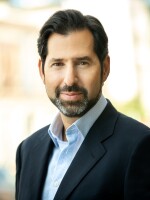NPR's board of directors announced Sunday that it had dipped into the world of public television for its new president and CEO: Gary E. Knell, chief executive of the company behind the beloved children's show Sesame Street.
Knell, 57, said he hopes to "calm the waters" at NPR after a rocky year in which the institution lost several top executives and faced renewed challenges to its funding.
Knell currently leads Sesame Workshop, the nonprofit education organization that also produces Electric Company, Dragon Tales and other highly regarded children's shows. He has been with the company since 1989, and rose through the ranks to become CEO in 2000. Under Knell's leadership, with the company's vigorous marketing and franchising efforts, Sesame Street has become a global powerhouse, warding off dozens of new entrants to the children's television field.
"I've learned how to master our way through a very competitive world out there, and one in which we have not lost our way and our mission, nor our qualitative edge," Knell said in an interview Sunday evening.
NPR board vice chairwoman Carol Cartwright, the past president of Bowling Green State University, was one of the two board members who led the search committee that picked Knell. "We were looking for someone who, while he or she might not be a journalist, would gain the respect of journalists," Cartwright said, "and would be able to be passionate about supporting and advocating the work of high-quality journalism."
Now Knell will take over one of the nation's leading news organizations. NPR draws 27 million listeners each week who tune in to hear reports from journalists scattered throughout the country and around the world. The network is also known for its music, culture and humor programs, as well as a vigorous presence on a variety of digital platforms drawing new audiences for that content. Knell said he intends to sustain such initiatives.
A Series Of Controversies
At first blush, NPR might appear to be playing it safe by selecting a chief associated with Big Bird rather than the news business.
Over the past year, NPR has been roiled by a series of controversies — including the termination of the contract of news analyst Juan Williams last October, followed by an undercover video sting by the conservative provocateur James O'Keefe III in March. An edited version of the video released by O'Keefe appeared to show NPR's top fundraiser disparaging Republicans and Tea Party conservatives, though a closer review of the complete video showed many of those remarks were presented in a profoundly misleading way.
Much of NPR's senior leadership was swept away, including its news chief, the fundraising official and its chief executive, Vivian Schiller.
Congressional Republicans also renewed a push to cut all federal funding for the public radio system. That push fell short. But NPR's board — which is dominated by member stations that rely on federal money much more heavily than NPR itself — took the funding threat very seriously.
Knell says he's well aware of NPR's recent history.
"I'm not naively walking into this," he said. "I think, obviously, [NPR has] been caught somewhat in the political cross hairs in Washington. Some of that is undeserved, I think. And what I would really like to see is depoliticizing NPR a little bit, so that it's not caught in those cross hairs."
Soon after his appointment was made public Sunday evening, people with ties to NPR and public broadcasting sent testimonials for Knell through Twitter.
Schiller, the former NPR chief executive who is now the chief digital officer for NBC News, wrote, "New @npr CEO Gary Knell is an experienced leader, a good man and a friend. Best shot to liberate pubradio from untenable reliance on fed $$."
NPR Weekend Edition host Scott Simon added, "Glad @NPRgaryknell new NPR CEO. Interesting, thoughtful choice. NPR News folk & Elmo & Company have many similarities!"
NPR Board Chairman Dave Edwards made a similar point, more seriously. In a memo to the staff, Edwards wrote, "Though it might not be immediately obvious, Sesame Workshop and NPR have much in common — outstanding, relevant programming and content that increases understanding among people — produced by talented people who are motivated by a dedication to excellence and mission."
Political Skills
A lawyer, Knell will arrive at NPR equipped with some political savvy as well. Three decades ago, he served as a committee counsel to Senate Democrats. More recently, Knell says, he collaborated with Republicans such as Kansas Gov. Sam Brownback and former Senate Majority Leader Bill Frist on childhood obesity issues and was appointed by former Secretary of State Condoleezza Rice to the U.S. National Commission on UNESCO.
Knell also previously oversaw several business and trade publications in Asia and served as a senior vice president and general counsel at WNET — the dominant public television station based in New York City and a significant producer of public television programming.
Knell said he would seek to increase funding for NPR's journalism from governmental, corporate and foundation sources. Otherwise, he said, he wants to get out of the way of its journalists, whom he called "amazingly fabulous."
"The point here is that it's not about liberal or conservative. It's about fairness," Knell said. "We've got to make the case that we're delivering a fair service — not only in the way we do our jobs but in the way we disseminate the news."
Board vice chair Cartwright said the panel of NPR staff consulted during the selection process lauded Knell. The employee panel was presented with a handful of possible candidates to evaluate, and Knell was the only one for whom the staffers mustered such enthusiasm.
Several former commercial TV network news executives said they would not allow themselves to be considered seriously for the position in part because of the recent political turmoil surrounding the network.
Other news officials questioned NPR's relationship with its stations, which effectively serve at once as its clients and its bosses. That point was underscored by the statement from board chairman Edwards — also the general manager of Milwaukee Public Radio — which praised Knell for having "the skills, experience, talent and vision to lead NPR into an even more dynamic future, while maintaining its commitment to serve Member stations and the public."
Knell said the relationship with member stations is vital to NPR's journalistic success and popularity: "The work that it's doing in all these local markets and all 50 states is something to feel pretty proud about."
In 2009, the most recent year for which Sesame Workshop's tax returns are publicly available, Knell received pay of $684,144 and additional compensation of $62,000. In the interview, he said he would be taking a substantial pay cut to accept the job. Knell also currently serves on the board of the for-profit arm of AARP, the advocacy group for people over age 50, but he said he would be leaving that post by early next year.
Knell is scheduled to take over from interim CEO Joyce Slocum, NPR's general counsel, on Dec. 1. He said he plans to move to Washington, where NPR's headquarters are based, from the New York City area, once his daughter has graduated from high school next year.
Copyright 2022 NPR. To see more, visit https://www.npr.org. 9(MDAzMjM2NDYzMDEyMzc1Njk5NjAxNzY3OQ001))







